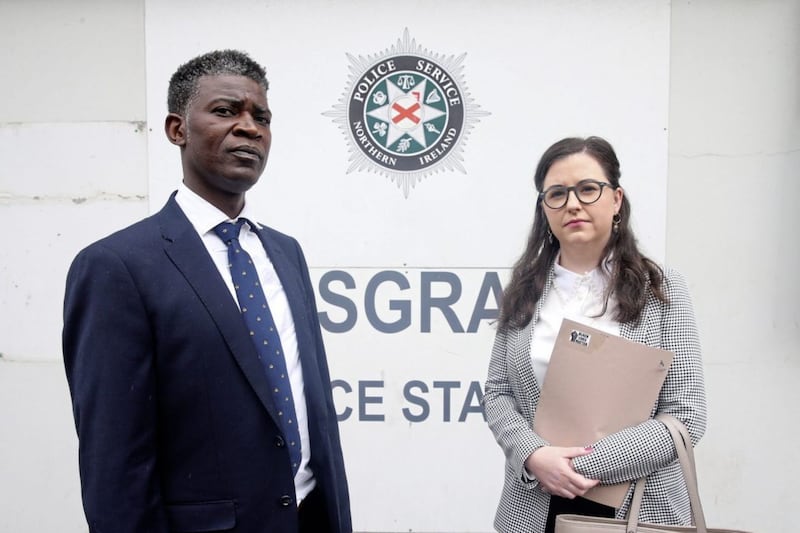TURA Arutura says "the ship has sailed" on an apology from the chief constable as he called for Simon Byrne's resignation and reform of Northern Ireland's "broken system".
Yesterday the 46-year-old campaigner attended Musgrave Street police station under caution under Section 44 of the Serious Crime Act 2007 - legislation usually applied to organised crime.
Mr Arutura, who has addressed a crowd of 82,000 people at the GAA's home in Croke Park, said he believes that none of the north's main political parties care about ethnic minority rights - leaving then unprotected from an "institutionally racist system".
He was approached by officers as he arrived at Belfast's Custom House Square to address demonstrators gathered there and in Derry on June 6 as part of a global anti-racism movement.
"I was invited to speak because the community needed a person who could articulate the feelings of the community - I am used to speaking to large groups of people," he said.
"The rally was well-organised and the volunteers were really sensitive to what needed to be done in terms of respecting people's health and the regulations.
"The police approached me just as I arrived and asked `What are you doing?' I told them I was going to be speaking and was told `You have to stand here while I check with my boss'.
"The boss told him to take my name, address and date of birth and caution me. I gave those details and then within 30 steps I was met by another police officer, a sergeant, who told me to `Go back home' or face the prospect of prosecution."
The father-of-three said he was surprised by officers' riot gear and the numbers deployed at the peaceful protest, "like they were expecting a riot".
Sinead Marmion of Phoenix Law said it "feels very personal" to its clients who were "black people protesting because a police officer killed a black man" in the United States.
"There is a loss of trust in the authorities, the lack of consistency is concerning considering reported race hate crime is higher than anywhere else in UK and conviction rates are lower.
"Immigration stop and search - which is based on racial profiling - is also the highest and now they are living in a society when they try to raise their voice they are silenced."
Mr Arutura believes the authorities' attitude that day bore the hallmarks of imperialism which "I recognise from apartheid. I lived in apartheid in South Africa and Zimbabwe and the background of colonialism is in Northern Ireland. We see it, I see it."
He claims the arrests and fines are a manifestation of deep-seated racism experienced by people of colour in Northern Ireland.
"We have to say these things because if we don't say it nothing changes. Look at the way the Racial Equality Strategy is sitting in somebody's drawer since 2015. The UK has terrible race laws, but Northern Ireland is worse.
"I would go as far as saying, in terms of institutions, this country is systematically racist. The lack of race law is because there is a lack of political will to implement the racial strategy. It there was that will it would have happened.
"You can see it in the way they have been behaving as regards disproportionate treatment of the Black Lives Matter people.
"We don't believe the main political parties here actually care - you can see that in their make-up. The census has ethnic minorities at 1.8 per cent, and that is out of date, you just have to look around to see it is much higher, it is more like three per cent.
"Where are the three per cent in the assembly or in the councils? ''
He added: "People are asking for Simon Byrne to apologise. That ship has sailed. People had 28 days to pay the fine and that has passed. Personally I call for the chief constable to resign.
"We've had the RUC to the PSNI transition but it's still not fit for purpose. We need to realise there is something that's deeply wrong with the establishment.
"What they exhibited in the way June 6 was treated was to show it in `black and white' how broken the system is and we can't build on a broken system.
"We are speaking the truth and we come from a place of love, not animosity. We want a better life for all of us."
The Executive Office insists it "is committed to tackling racial inequalities and eradicating racism from our society".
"The Racial Equality Strategy is a 10 year framework which recognises the scale of this challenge and the time it will take to deliver meaningful change.
"Good progress has been made in taking forward the actions in the Strategy supported by the Racial Equality Subgroup and Racial Equality Champions who have been appointed in each Executive department.
"This important ongoing work requires a sustained cross-sector, whole of society approach and we all have a part to play."
The PSNI it is "very keen" for legal challenges in relation to protests and a pending judicial review "conclude as quickly as possible, so that any lessons learned can be given due consideration; and it is important that any learning helps to inform ongoing community engagement and relationship building".
A spokeswoman said because they are ongoing "it would not be appropriate for the Police Service of Northern Ireland to comment further at the present time".



